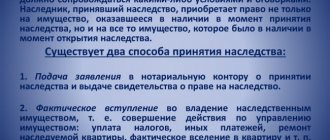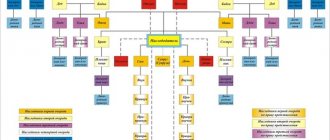What does it mean to actually accept an inheritance?
If the deceased left property, it passes to his heirs: relatives by law or claimants by will.
Expert opinion
Stanislav Evseev
Lawyer. Experience 12 years. Specialization: civil, family, inheritance law.
The remaining property, even after the death of a person, is still registered in his name. In order for the heirs to be able to fully dispose of the assets, they will need to re-register the papers. Part of the procedure is carried out by a notary: accepting applications, protecting and distributing property, issuing certificates of inheritance. If the heirs accept the inheritance, they are given 6 months to submit applications to the notary.
| Actions aimed at actual acceptance of inheritance | A comment |
| Possession | Relatives of the deceased can live in his apartment, own a car, land and other property - as it was during the life of the testator. |
| Control | It is expressed in the disposal of the assets of a deceased citizen (for example, the transfer of land for free use). |
| Protection | The remaining property of the deceased is the object of claims from third parties - the actual heir can install a security system, alarm system, locks, codes and other protection. Transferring things for storage is also a measure of protection against attacks by third parties not from among the heirs. |
| Maintenance/repair | The heir maintains the property in proper condition (for example, pays utility bills - in the case of an apartment; orders a technical inspection (MOT), repairs the car; cultivates the land, removes weeds, roots, dilapidated buildings. |
| Repayment of debts of the deceased | If the testator left behind not only property, but also debts, the heir can begin repaying the loan, loan, mortgage, tax and insurance contributions. Alimony payments and compensation for damage to health cease with the death of a person - the heirs do not pay for them. |
Even if the heir carries out only one of the named actions, it is considered that he actually accepted the inheritance (Clause 2 of Article 1153 of the Civil Code of the Russian Federation). Consequently, he has every right to contact a notary and obtain a certificate of inheritance. Until the heir receives the certificate, he will not be able to become the owner of the property of the deceased.
Date of actual entry into inheritance
Legally significant actions with property show that the heir is ready to accept the inheritance. However, we should not forget about the deadline for accepting the inheritance.
The main condition is to meet the 6-month deadline from the moment the inheritance case is opened (clause 1 of Article 1154 of the Civil Code of the Russian Federation). Let us remind you that it opens after an appeal from the relatives of the deceased.
If the heir did not have time to accept the inheritance, it is considered that he has lost the rights to the assets of the deceased. However, the law allows for the restoration of the deadlines for accepting an inheritance after the fact - in accordance with paragraph 1 of Art. 1155 of the Civil Code of the Russian Federation, the heir has the right to file an application with the court with a request to restore the missed period.
Of course, there must be good reasons for this (ignorance about the opening of an inheritance, long-term treatment, business trip, being in an emergency or combat zone). If the court considers that the reason deserves attention, the term will be restored, which means the applicant will have a chance to contact a notary and accept the inheritance in fact.
Possibility of pre-trial settlement
Resolving the issue without a court is the most attractive way out of the situation. However, it can only be carried out if other owners and future heirs have nothing against a pre-trial settlement, which involves a meeting of all heirs at the notary and their joint agreement that the property will be transferred to the person who actually entered into the inheritance .
Consent must be in writing. If there is no consent, or there are no other heirs, then such procedures are not necessary at all. You just need to come to the notary with a statement that you want to become the owner of the property that belonged to the testator.
How to enter into an inheritance after the fact?
Actual taking of ownership implies physical possession of a specific object. For example, the heir must live in the apartment at the time of the testator’s death or move into it immediately after his death.
If the applicant uses part of the property that belonged to the deceased citizen, then he is considered to have accepted all the property - including obligations, debts, etc.
Do I need to contact a notary?
Mere use of property is not enough. Before becoming the new owner of the deceased's assets, the heir must obtain inheritance rights. In order to enter into an inheritance in fact, you will have to contact a notary.
Please note that the actual acceptance of the inheritance only requires the issuance of a certificate of inheritance. The applicant must provide evidence of ownership, management, maintenance or security of the property.
Based on the evidence, the notary establishes the fact of acceptance of the inheritance. If no questions arise, the heir will receive a certificate and will be able to register the property with Rosreestr, the Federal Tax Service or the State Traffic Safety Inspectorate.
Contacting a notary is a right, not an obligation of the heir. However, if you do not contact a notary, you may encounter legal difficulties. For example, proof of real ownership of property after the death of the testator. Disputes are resolved in court, which, as you understand, is not very beneficial to the heirs.
Procedure
So, the heir decides to accept the property of the deceased after the fact.
Algorithm of actions:
- Decide on the composition of the property.
- Carry out any action of actual acceptance of property (see above).
- Prepare evidence of the actual acceptance of the inheritance mass.
- Contact the notary at the place where the inheritance was opened, provide evidence, and pay the state fee for issuing the certificate.
- Wait until the 6 month period has expired.
- Receive a certificate of the right to inheritance - with the seal and signature of a notary.
- Complete the registration of property rights with the Rosreestr authority.
Whether or not to contact a notary is at the discretion of the heirs. Lawyers recommend taking advantage of this opportunity, even if you are sure that only you will get the property.
Evidence of actual acceptance of inheritance
Actual acceptance of assets and provision of proper facts are not the same thing. The heir must provide written and oral evidence of this fact.
Otherwise, the notary will refuse to issue a certificate of inheritance. Then the applicant will be able to exercise his right only through the court. However, here, too, documents will be required that substantiate the plaintiff’s claims.
What papers can be used as evidence? A notary is guided in his activities by the law and methodological recommendations.
The courts take into account the instructions of the Resolution of the Plenum of the Armed Forces of the Russian Federation No. 9. Therefore, when preparing the evidence base, it is advisable to familiarize yourself with the provisions of legal acts.
List of documents confirming acceptance of inheritance:
- Russian Federation passport - page with the citizen’s registration;
- certificate from the Housing Office - the document confirms cohabitation with the testator;
- bank documents on payment of utilities, taxes, fees, repayment of loan debt - both paper receipts and online printouts of checks with the bank’s seal are suitable;
- an agreement with a contractor to carry out repair work in the apartment of a deceased person;
- an agreement on the transfer of property for free use (not to be confused with a lease, since ownership has not yet been formalized);
- papers confirming the demand for money from third parties (for example, a court ruling on the claim of an heir);
- testimony of witnesses - friends, neighbors, creditors, workers, etc.
These actions must be carried out within 6 months after the death of the previous owner of the assets. In other words, the heirs prove that they took actions aimed at accepting the property. If they paid the electricity debt one-time in the interests of the testator, this does not speak in favor of the actual acceptance of the inheritance.
State duty and expenses for lawyers and attorneys
The procedure for entering into an inheritance is preceded by expenses. So, you need to pay a state fee, which is equal to two thousand rubles. You also need to pay an inheritance tax of 13% of the amount.
If you use the help of lawyers, attorneys, or notaries, you pay the amount that they set privately. The cost of the work of such specialists largely depends on the region of your residence, as well as on the level of professionalism of a particular specialist.
Actual acceptance of inheritance in court
Often, heirs have to defend their rights in court. Let us say right away that the procedure is not easy.
However, with the right attitude and evidence base, you can count on success. Let's figure out how to prove the actual acceptance of an inheritance in court.
Which court should I go to?
The heirs file appeals to the district or city court at their place of residence (Article 266 of the Code of Civil Procedure of the Russian Federation). However, if the property includes real estate, the application or claim is filed at its location.
For example, if the object is an apartment in Khimki, and the heir lives in Orekhovo-Zuevo, he needs to file a claim in the city court of Khimki.
Before going to court, you need to determine the nature of the case:
- special proceedings - an application is submitted to establish the fact of acceptance of the inheritance (clause 9, clause 2, article 264 of the Code of Civil Procedure of the Russian Federation);
- claim proceedings - the heir files a statement of claim, and the defendants are the remaining claimants to the inheritance.
Special proceedings are not related to a dispute between heirs, while claims are the presence of objections regarding the division of the property of the deceased.
When is it necessary?
Cases when heirs are forced to ask for judicial protection are varied:
- omission and restoration of deadlines for accepting an inheritance;
- refusal of a notary to issue a certificate of inheritance (see “How to appeal such actions?”);
- lack of documents for the object of inheritance;
- lack of evidence to confirm the actual acceptance of the inheritance;
- refusal to register property rights, etc.
The plaintiff may present several demands at once (for example, to establish the fact of acceptance of an inheritance and recognition of ownership rights).
Application to establish the fact of acceptance of inheritance (sample)
The absence of disputes between claimants to the inheritance does not require the filing of a claim and consideration of the case at a hearing. It is enough to submit an application to the court and the collected evidence, then pay the state fee and wait for the verdict.
Statement of claim for recognition of ownership rights (sample)
Submitted in case of a dispute between heirs or when a notary refuses to issue a certificate. Claims can be independent or complement each other. It is advisable to obtain legal advice and decide on tactics for protecting your interests in court.






